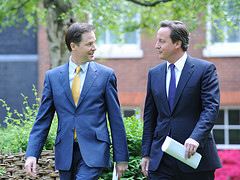
On the BBC’s Sunday Politics programme this week, former Defence Secretary and darling of the Tory Right, Liam Fox, suggested that ‘it is a game for academics’ to discern as to whether a Cameron Government policy (i.e. without Liberal Democrat restraint) would be that different from a Coalition Government policy.
I reckon it’s not just an ‘academic game’, but nevertheless I’ll give it a go. The central contention here is that a Tory majority Cameron Government would, mutatis mutandis, be no different to today’s Coalition Government in terms of ideology, public policy and behaviour. Some academics agree. Tim Bale and Robin Kolodny observed recently that Britain has a ‘Coalition government but one that, to all intents and purposes, looks, sounds and behaves like a Conservative administration, and this is unlikely to change’.
But this is putting it too diplomatically. I suggest that this is a Conservative administration, with a miscellany of forgettable Liberal Democrats serving as decoration and window-dressing. The Liberals’ influence on the great offices of state is minimal if not non-existent. There, I said it.
The coalition agreement, which, let us remember, was negotiated and produced within 5 days, appeared to give the Tories most of what they wanted, and especially on the all-important economic policy side of things. Furthermore, after negotiations, the Tories emerged in control of all the major offices of state – the Treasury, the Foreign Office, the Home Office, Health and Education.
And the proof is in the policies. Look at the proposals for deficit reduction. In theory, the differences should be starkest over the the speed at which the deficit should be corrected. Prior to the formation of the coalition, the Liberals and the Conservatives were, in terms of the narrow ideological ground on which post-Thatcher politics is fought, quite far apart. Despite Nick Clegg’s suggestion that he is the ‘heir to Thatcher’ in the run-up to the May 2010 General Election, the Liberal Democrats went into the election with a broadly similar economic policy to Labour’s. The exception was his plans to cut the deficit with spending cuts alone (even theTory commitment was 80/20 spending cuts and tax increases).
Call the Lib Dem’s plan Keynesian-lite. But thereafter, the Coalition’s economic strategy has been an inversion of Keynesianism. The only part of the coalition’s deficit agreement that matters in the long term reads as follows:
The deficit reduction programme takes precedence over any of the other measures in this agreement, and the speed of implementation of any measures that have a cost to the public finances will depend on decisions to be made in the Comprehensive Spending Review.
The Liberal Democrats went into the election promising a modest but honest deficit reduction strategy. Unlike Labour, apart from Gordon Brown’s last-minute acceptance that spending cuts had to be made, the Liberals were honest about the need for reductions. However, timing was important. As the Liberals themselves said:
“We must ensure the timing is right. If spending is cut too soon, it would undermined the much-needed recovery and cost jobs. We will base the timing of cuts on an objective assessment of economic conditions, not political dogma. Our working assumption is that the economy will be stable enough to bear cuts from the beginning of 2011-12”.

But that is exactly what happened, and Vince Cable provides an inadequate explanation for the change of heart from a Keynesian position on the economic crisis to one that broadly chimes with the gurus of the New Right. Of course, Cable suggests that the Coalition’s ‘expansionary fiscal contraction’ would have the fulsome support of the ‘liberal’ Keynes, but the Conservatives departed not one bit from their central economic plans outlined in the Tory manifesto of 2010 (admittedly, inheritance tax cuts were postponed). An emergency Budget in June 2010 set the parameters (and commitment of the Coalition) to eliminating the bulk of the structural deficit over one Parliament. Furthermore, cuts were ushered in as soon as they came into government, with a ‘modest’ £6 billion in cuts (sorted out pre-election by two former efficiency advisers Sir Peter Gershon and Dr Martin Read) and instant pay freezes in the public sector.
It is not just economic policy where the Tories hold sway. Education policy (free schools, the pupil premium, etc), welfare reform (welfare-to-work programme, the benefit cap), health policy (GP-commissioning, the abolition of the PCTs, more competition), just to name a few, are all to be found in Tory Party thinking during Cameron’s time as leader of the Opposition.
Face it: the language, ideology and public policy practice of the Coalition Government is Tory. It makes accommodations to Liberal rhetoric, which is something Cameron did prior to the formation of the Coalition, with his much-derided talk of ‘liberal Conservatism’. A movement from Big Government to the Big Society and a movement from a provision-based state to a framework-based state is agreed to by both parties. However, the means to get there are dictated by Cameron and Osborne, with Clegg and Alexander making attentive spectators.
Matthew Lakin is a DPhil student in Politics at Oxford.








1 Comment
Really good article. I do agree with the main thrust of it, but one has to remember the wind turbines and the abandonment of the marriage tax break, not to mention reform of the House of Lords. I don’t think Tory bias is ingrained in the coalition agreement or in the internal politics of the coaliton, I think the significant, but not overwhelming Tory bias is due to the fact that the wider public by and large see Liberal proposals as bonkers.If Clegg had been successful in thrusting AV upon us, something you probably would have liked, being a Red Tory and all, we would be seeing things diffidently now.